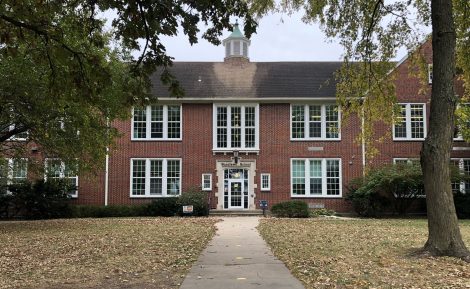Solar lawsuit moves back to local court; County Commission may act on controversial project before new commissioners are seated

photo by: Shutterstock
Solar panels are shown in this photo from Shutterstock.
A lawsuit regarding a large solar project is heading back to Douglas County District Court, but now there are questions about whether the county may act on the controversial development before new county commissioners are seated in January.
A federal judge on Monday ruled that a lawsuit filed by area businesses and neighbors protesting the Kansas Sky Energy Center should be heard in Douglas County District Court rather than federal court.
At the same time — in response to questions from the Journal-World — a county spokeswoman said county officials now expect to have key studies about the solar development complete and ready for County Commission action before the end of the year.
That timing — which is the first the county has suggested — is significant because the Douglas County Commission is in the process of expanding from three members to five members during the Nov. 5 general election.
The election will produce at least two new members for the commission, but could produce as many as four. Incumbents Shannon Reid and Karen Willey both are facing opposition from candidates who have spoken against the solar project.
While the election is next week, commissioners won’t take office until January. The Kansas Sky Energy Center — which would build 8 million square feet of solar panels on about 600 acres of Kansas River valley farmland in northern Douglas County — still needs a pair of approvals from the County Commission before it can proceed.
Since the project won initial approval in April, the county has been tight-lipped about when it expects the project to come back for a final hearing. With the update on Monday, there’s now a clear possibility that the project could be decided after the Nov. 5 general election but before new commissioners take office in January.
William Skepnek, a Lawrence attorney for the plaintiffs, said his group will be prepared to fight any such action.
“I’ve heard they may intend to act before the new commission is in place,” Skepnek said. “We are alert to the possibility that we may need to go to court to ask for emergency relief to stop them from doing that.”
The project awaits approval of a stormwater management plan that could have major implications for whether the rainwater runoff from the solar panels will cause flooding issues for the North Lawrence neighborhood downstream of the project. Skepnek said it is his position that nothing should proceed on the solar project until the lawsuit is resolved.
“It seems to me to be logical that status quo is where we ought to remain until a court has ruled on our claim,” Skepnek said.
On Monday, parties in the case did get new clarity on where arguments in the lawsuit will take place.
Attorneys for the county sought to have the lawsuit moved to federal court, but the plaintiffs — which include Grant Township, the North Lawrence Improvement Association and more than 20 other businesses and individuals in the area — argued the case should be heard in Douglas County District Court, assuring that a local jury would decide the matter.
U.S. District Court Judge Julie Robinson sided with the plaintiffs, ruling that any federal issues that are involved in the lawsuit don’t rise to the level that would justify taking the case away from the state court system.
“(T)he Court finds that Plaintiffs’ state constitutional claims are not capable of resolution in federal court without disrupting the federal-state balance approved by Congress,” Robinson wrote in her ruling.
Skepnek said the ruling now puts the case back in front of Douglas County District Court Judge James McCabria. Skepnek said it is proper that lawsuit be decided in a local venue, rather than the federal court system, which would have produced a jury from across the state to hear any trial.
“It seemed crazy to me and I don’t understand why they would want this resolved in federal court rather than in Douglas County,” Skepnek said in a brief interview with the Journal-World. “Why would you rather have this heard by a federal jury rather than a local jury?”
The county filed its motion to move the case to federal court because the case invoked an argument involving the 14th Amendment of the U.S. Constitution, which guarantees due process. The plaintiffs, however, removed the 14th Amendment argument from the case once the county sought to have the case moved to federal court.
A spokeswoman for the county said the county had no comment on the latest ruling.
Skepnek said the next issue in the case likely will be whether the private company that is proposed to develop the Kansas Sky Energy Center — a subsidiary of the energy company Shell — should be allowed to intervene in the case. The company hasn’t been sued as part of the lawsuit, but attorneys for the company argue its rights are at stake in the matter. The plaintiffs are arguing against allowing the company to enter the lawsuit.
After that issue is resolved, a timeline involving depositions and, ultimately, a jury trial could be set, Skepnek said.

photo by: Chad Lawhorn/Journal-World
High voltage electric transmission lines run through a farm field near the site of the proposed Kansas Sky Energy Center. Developers of the solar project say the presence of the lines is one of the reasons the site would work well for the project.
The Kansas Sky Energy Center — which largely would surround the grain elevators at the point on U.S. Highways 24/59 commonly known as Midland Junction — has drawn both large numbers of opponents and supporters.
Supporters have said the project would help Douglas County do its part in battling climate change by producing large amounts of clean, renewable energy. When completed, the project would produce enough electricity to power about 30,000 homes, the developers have said.
Opponents largely have said they don’t oppose the idea of solar energy, but believe the proposed site of the plan will inappropriately occupy prime farmland and will worsen stormwater flooding issues both for nearby rural residents and for large parts of North Lawrence, which is downstream of the project site.







